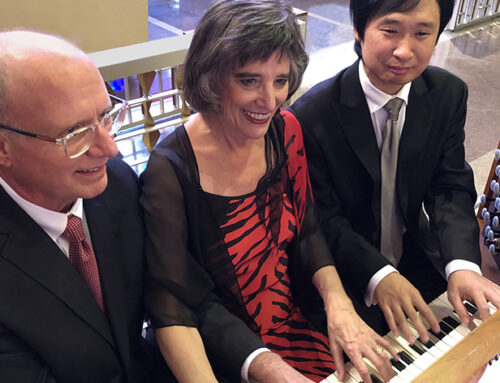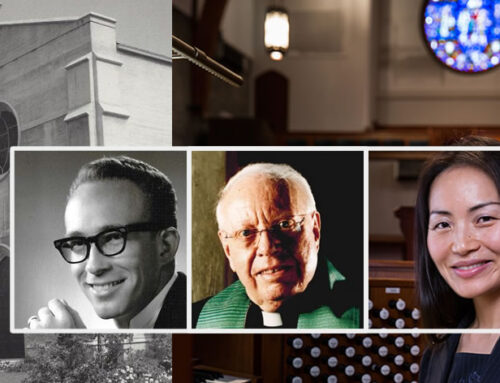Holy God,
Open our hearts, that we may be attentive to your spirit among us;
Focus our minds, that we may discern your will;
Teach our spirits, that we may anticipate joy; and
Guide our feet, that we may walk the road of love and peace.
Amen.
In the late summer of 1741, a new oratorio libretto was ready for Mr. Handel’s attention. According to tradition, Messiah, this biblical compilation by Charles Jennens, was set to music by Handel in just 24 days. And here we are, 263 years later, still irrepressibly drawn to Messiah by Handel.
Have you come here tonight to be charmed by this Messiah, or have you come to be challenged? My hope is that you will be charmed and challenged. Charmed, comforted, soothed, healed — by the timeless beauty of this magnificent wedding of text and music … and challenged, inspired, transformed, strengthened — by the power of its message and fierce relevance for us today.
Sometimes, with music that is so beautiful and so universally loved that it can be heard in shopping malls and elevators, we can miss a really important message. What are the great Hebrew prophets, Isaiah and Malachi, saying? How can they speak to us today, through the now-comfortable familiarity of Handel?
I believe this Messiah is radically counter-cultural, if we open our eyes and our ears and our hearts.
“Every valley shall be exalted, and every mountain and hill made low.”
This is not some sugarcoated sentiment but a dynamic, radical vision of life in the kingdom of God. Isaiah points us to the Reign of God — the commonwealth of love, in which every creature is recognized as a precious child of God. In this vision, the world as we know it is literally turned upside down.
“Every valley shall be exalted, and every mountain and hill made low” … and in Isaiah’s vision … “the glory of the Lord will be revealed”, on that plain where “all flesh shall see it together.” All flesh. What is it about “all” that we find so difficult? God’s embrace isn’t for some flesh, but all flesh. And yet, we continue to construct walls that divide us — God’s children — all of us, sisters and brothers.
How ridiculous would it be for me to pronounce that God favors and speaks most clearly to bald men? I actually might be able to convert some to this belief. I mean, there is some logic to it. God doesn’t need to wade through thick locks of hair to get to our brains. So God speaks most clearly to the chosen balding, and there are many here in the chancel who could substantiate this claim.
Of course, that is utter nonsense, but no more so than any of the other constructs we build, based on gender, race, class, religion, sexual orientation, nationality, etc., etc., etc. We must proclaim that all are included in God’s family. All flesh shall see God’s glory together.
Now, the libretto of this Messiah gets even more challenging.
Malachi asks the question: Who made abide the day of God’s Reign — who could possibly stand? Do we have the courage and strength to survive the Refiner’s fire? Perhaps this isn’t the loveliest image. Nonetheless, I believe we lose something important if we too quickly pass by the righteous Judge.
Would that we had the awesome humility — as individuals, as a community, as a society — to be purified, to repent, to turn around, to get our feet back on the highway of God’s peace, joy, justice, compassion, forgiveness, and reconciliation. If we would allow ourselves to be purified, to be refined, to be transformed … then we could be equipped to make our lives an offering in righteousness.
In her book The Seeds of Heaven, Barbara Brown Taylor writes: “This righteousness has never been a matter of following rules but of honoring relationships — with aliens as well as kin, with enemies as well as allies. When we honor our neighbors — when we love them as ourselves — then, and only then, are we ready to discover what the law, the prophets, and the gospel are all about.”
My friends, we have allowed God’s dream for the human family to be distorted and manipulated. We have allowed this Messiah to be corralled into an exclusive corner by those who are trapped in a world of deadly fear.
And the time has come to rise out of our weak resignation and timidity and to let our voices be heard, to put on the armor of God, to reclaim the God of love who includes all flesh — to fight this battle against sovereigns and powers which demean human life … to do nothing less than reclaim the Prince of Peace — this Wonderful, Wise and Mighty Messiah who has been captured by some and turned into a loathsome, obstinately narrow-minded bullying warrior.
One of my favorite journalists is Patt Morrison, who used to host the KCET program Life and Times and now writes a weekly editorial column for the LA Times. I resonate with her quirky sense of humor, and I agree with or am happily challenged by about 95% of what she writes. We correspond with some cordial regularity, but a couple weeks ago she really got my dander up. In her December 8, 2004 editorial she wrote: “…we too can become a nation mature enough and sophisticated enough to understand the difference between religion as historical relic and religion as present-day bully pulpit (emphasis on bully).” I emailed her immediately, expressing my dismay over her simplistic bifurcation of religion in the U.S. as either dead or abusive. For as long as the media wholesales “morality” to the fundamentalist religious right there is little hope.
And yet, as a people of tenacious hope and prayer, my sisters and brothers, it is time to reclaim our faith in God’s vision of all creation as one. We need our inner blindness to be healed and our faltering footsteps to be strengthened. Our voices must ring out the joyful news of peace on earth and goodwill to all — for this Messiah has no hands and voices but ours.
I am so charmed and challenged by the angel sequence.
The angel appears to the shepherds, scaring them nearly to death, then reassuring them that everything is going to be okay — that there is good and joyful news to share. Then Handel paints the immense fluttering of a great multitude of angels, and a dialog ensues, with the messengers of God giving us the vision of heaven on earth — of peace on earth and goodwill to all. In the music, you can almost hear the angels coaching the shepherds, “Okay now, repeat after me … Goodwill.” The shepherds reply, “Goodwill.” Again and again, until the angel voices merge with the shepherds, proclaiming God’s all-embracing love.
And then, Handel’s canvas reveals the luminous image of God’s messengers departing to the heavens, and we are left here, in community. The vision has been given to us … glory to God is peace on earth, and the angels are not going to take care of it for us. God has no hands on earth, but ours. God has no feet … no eyes, no ears … no voices, but ours.
I believe this Messiah calls us to join hands and hearts — to seize this moment and build that holy city here on earth—that city whose laws are love, and joy and justice and compassion and laughter and peace and reconciliation.
May this Messiah charm us and challenge us tonight. Amen.


